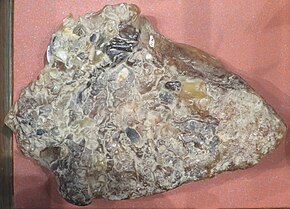Ambergris
It acquires a sweet, earthy scent as it ages, commonly likened to the fragrance of isopropyl alcohol without the vaporous chemical astringency.
[5] This fossilized resin subsequently became the dominant (and now exclusive) sense of "amber", leaving "ambergris" as the word for the whale secretion.
The archaic alternate spelling "ambergrease" arose as an eggcorn from the phonetic pronunciation of "ambergris," encouraged by the substance's waxy texture.
[9] Ambergris is formed from a secretion of the bile duct in the intestines of the sperm whale, and can be found floating on the sea or washed up on coastlines.
[7] Because the beaks of giant squids have been discovered within lumps of ambergris, scientists have hypothesized that the substance is produced by the whale's gastrointestinal tract to ease the passage of hard, sharp objects that it may have eaten.
Christopher Kemp, the author of Floating Gold: A Natural (and Unnatural) History of Ambergris, says that it is only produced by sperm whales, and only by an estimated one percent of them.
[13] Ambergris is found primarily in the Atlantic Ocean and on the coasts of South Africa; Brazil; Madagascar; the East Indies; The Maldives; China; Japan; India; Australia; New Zealand; and the Molucca Islands.
[7] When initially expelled by or removed from the whale, the fatty precursor of ambergris is pale white in color (sometimes streaked with black), soft, with a strong fecal smell.
Following months to years of photodegradation and oxidation in the ocean, this precursor gradually hardens, developing a dark grey or black color, a crusty and waxy texture, and a peculiar odor that is at once sweet, earthy, marine, and animalic.
Throughout the 19th century, "millions of whales were killed for their oil, whalebone, and ambergris" to fuel profits, and they soon became endangered as a species as a result.
Urine, faeces, and ambergris (that has been naturally excreted by a sperm whale) are waste products not considered parts or derivatives of a CITES species and are therefore not covered by the provisions of the convention.
